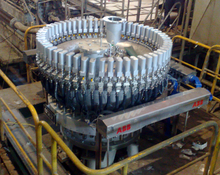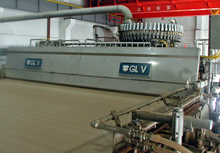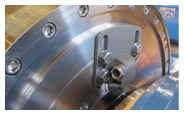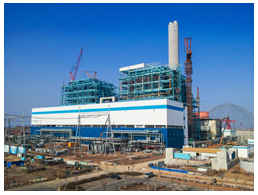Ianadmin
GL&V News: BTF™ Headbox & Retrofit Start-Ups in China
 GL&V recently began assembling BTF™ Headboxes and Retrofit Systems for the Chinese marketplace in China, using critical components manufactured in Canada and other parts manufactured in China by local supplier partners. Rigorous training and quality control systems were put in place to ensure that the resulting BTF products would meet GL&V quality standards. A total of 5 new headboxes and 4 retrofits have already been sold and manufactured with this new process. Several of these started up recently and are operating very successfully.
GL&V recently began assembling BTF™ Headboxes and Retrofit Systems for the Chinese marketplace in China, using critical components manufactured in Canada and other parts manufactured in China by local supplier partners. Rigorous training and quality control systems were put in place to ensure that the resulting BTF products would meet GL&V quality standards. A total of 5 new headboxes and 4 retrofits have already been sold and manufactured with this new process. Several of these started up recently and are operating very successfully.
Lee and Man, the second biggest paper company in China, installed and started up a BTF dilution control headbox retrofit on the base ply of their PM3 linerboard machine in September last year. Performance optimization trials were run in October and the installation met all performance guarantees. In addition to the expected improvements in the sheet CD profile, the mill also realized significant savings in chemical costs. Lee and Man have ordered two more BTF retrofit systems, one for their PM5, which will start up later this year, and one for their PM7, which recently started up successfully
in February.
 Zao Zhuang Huarun started up four new BTF headboxes on their PM4 four-ply gypsum board machine in September 2012. Performance optimization trials were run in November and following successful testing, the customer released all performance guarantees. This customer already has two older BTF headboxes on their PM3 machine, now making a total of 6 BTF headboxes in this mill.
Zao Zhuang Huarun started up four new BTF headboxes on their PM4 four-ply gypsum board machine in September 2012. Performance optimization trials were run in November and following successful testing, the customer released all performance guarantees. This customer already has two older BTF headboxes on their PM3 machine, now making a total of 6 BTF headboxes in this mill.
UPM to Close 2 Paper Machines one in Germany and one in Finland
UPM will permanently close down the paper machine 3 at UPM Rauma mill in Finland and the paper machine 4 at Ettringen mill in Germany by the end of the April 2013. The number of employees is reduced by 87 in UPM Rauma mill and by 150 in UPM Ettringen mill.
The employee negotiations concerning the closing plans were concluded in March. UPM has also concluded the employee negotitations with the employee representatives concerning streamlining the Paper Business Group and global functions in Finland. Employee negotiations in global functions continue in several countries following local schedules and processes. The selling processes of UPM Docelles paper mill and UPM Aigrefeuille further prosessing mill in France continue.
In the Finnish employee negotiations the argumentation of personnel reductions, schedule and change support for the redundants were discussed.
“The employee reductions are inevitable under the circumstances. UPM will support former employees through re-employment and retraining in many ways,“ says Jyrki Ovaska, President of the UPM Paper Business Group.
Employee reductions are a result of UPM’s need to permanently reduce paper capacity in Europe by a further 580,000 tonnes. Current business environment also makes evident the need for streamlining of the Paper Business Group and UPM’s global functions to remain cost competitive in the new business scale. UPM announced its plans on January 17, 2013.
The continuing challenges in European economy have significantly impacted the consumption of paper, exacerbating the effect of structural changes in paper end-uses and resulting in further decline in the demand of graphic papers in Europe. High costs and significant overcapacity continue to challenge the industry operators in Europe.
Norske Skog's accounts for the first quarter of 2013
The accounts of Norske Skog for the first quarter of 2013 will be published on Thursday 25 April at 7:00 AM CET.
There will be a presentation of the accounts at DnB's offices in Oslo, Bjoervika at 8:30 a.m. CET. The presentation will be transmitted live through a link on Norske Skog's website www.norskeskog.com. A recording of the presentation will be made available.
An international telephone conference will further be held at 1:00 PM CET. A podcast of the conference will be made available. Details for the telephone conference below:
|
+44(0)20 7136 2055 |
Confirmation code: 3074890 |
We kindly ask participants to dial in before 12:55 PM CET.
The President and CEO, Sven Ombudstvedt, and other members of corporate management will participate in both events.
Please observe that Norske Skog now has entered a "silent period" ahead of the results.
ANDRITZ launches the TurboJet weir plate
 International technology Group ANDRITZ presents a new generation of weir plates, providing a significant reduction in power consumption for centrifuges. The patented TurboJet weir plate, available for all ANDRITZ decanters and those of other suppliers, helps customers to reduce their energy consumption by 10-30%.
International technology Group ANDRITZ presents a new generation of weir plates, providing a significant reduction in power consumption for centrifuges. The patented TurboJet weir plate, available for all ANDRITZ decanters and those of other suppliers, helps customers to reduce their energy consumption by 10-30%.
This innovative product was developed in the ANDRITZ SEPARATION Center of Competence in Châteauroux, France, and passed extensive testing on various customers’ sites, e.g. for waste water treatment, bioethanol production, calcium carbonate separation, as well as in the food and chemical industries. The TurboJet weir plate guides the liquid discharge from the centrifuge in the opposite direction to the bowl rotation. Adjustable nozzles form a jet that creates a reaction force in the same way as a jet engine’s exhaust and recovers the kinetic energy from the liquid. This extra force enhances bowl rotation and thereby reduces main drive power consumption without affecting actual separation performance. Power savings vary depending on feed flow, pond depth, and bowl speed.
Mario Plourde to Succeed Alain Lemaire as President of Cascades
Jiangsu Huadian Jurong Power chooses Metso’s automation for its two 1000 MW units in China
Advanced automation systems will contribute to more efficient and less polluting electricity generation in two large units that feature ultra supercritical technology and thereby support economic growth in Eastern China in an environmentally responsible way.
 Jiangsu Huadian Jurong Power Co. Ltd. has chosen Metso’s automation systems for its two greenfield 1000 MW power plant units located in Xiashu Town, Jurong City, Jiangsu Province, China.
Jiangsu Huadian Jurong Power Co. Ltd. has chosen Metso’s automation systems for its two greenfield 1000 MW power plant units located in Xiashu Town, Jurong City, Jiangsu Province, China.
Scheduled to start up in the coming summer, the units are the first 1,000 MW units with ultra supercritical technology to be built by Jiangsu Huadian Jurong Power. Ultra supercritical technologies can boost the efficiency of coal-based electricity generation by approximately 50% and produce less emissions compared with traditional subcritical coal-fired power plants. China has become a hotbed of ultra supercritical construction as the country seeks to satisfy its growing power requirements.
By investing in these large units with ultra-supercritical technologies, Jiangsu Huadian Jurong Power is supporting economic growth in Eastern China in an environmentally responsible way.
Both power plant units will be controlled with Metso’s automation systems from one central control room. The systems will monitor, control and optimize the performance of the units along with the common services at the plant site. The DCS is designed for both functional and physical distribution. The main function includes, for example, automatic startup and shutdown, performance monitoring and data links to other balance-of-plant systems.
The turbine control system, boiler feedwater pump turbine control system and flue gas desulphurization system will also use Metso’s DNA hardware and software, and will be integrated into the distributed control system, although they are supplied by other vendors.
In both main plant control systems, there are 33 pairs of digital processing units and approximately 14,000 hardwired I/Os. In addition, redundant gateways will transfer information from various systems or subsystems into the unit control systems. The common system is geographically distributed in the circulating water pump house, demineralization water pump house and auxiliary power equipment room, and controlled and interlocked through unit DCS operator stations.
Jiangsu Huadian Jurong Power Co., Ltd. is a joint venture between China Huadian Corporation and Jiangsu Electric Power Development Co., Ltd. The company was founded in 2008.
Paper Safer Than Cloth For Household Cleaning
A household item that’s often taken for granted your dishcloth can potentially present a serious threat to your family’s health.
That’s because a used dishcloth can redeposit millions of germs after a single day’s use across the surfaces that a family comes in contact with throughout the day.
A Safer Alternative
Fortunately, there is an alternative. That’s the word from Dr. Elizabeth Scott, founder and co-director of theSimmonsCenterfor Hygiene and Health in Home and Community Settings atSimmonsCollegeinBoston. She suggests using disposable paper towels instead.
Said Dr. Scott, “To use a paper towel and then throw it away is a very smart thing to do, especially on any surface in your kitchen where you’ve been preparing food.”
A Clothlike Experience
One of the latest developments in paper towels is designed to offer consumers a clothlike cleaning experience.
Bounty has introduced its DuraTowel, a paper towel designed to replace germy dishcloths for a cleaner way to clean. Thick and strong even when wet, a single sheet is intended to be durable enough to tackle tough jobs such as cleaning countertops, sinks and even small appliances.
To learn more, visit the website at www.bountytowels.com or follow them on Twitter @bounty. You can also “like” them at www.facebook.com/bounty.
Eco-friendly paper made of jumbo dung used at TEDx
Ever heard of papers made of elephant dung infused with flower seeds? Interestingly, the name tags and handouts carrying speaker profiles at the TEDx Coimbatore on Saturday were made of jumbo's excreta, with the idea of making them reusable.
"These papers if sown and watered will grow," said Uma Maheswaran VK, manager (communications) of Park Group of Institutions. He said they were introduced with focus on eco-friendly products. "Most often, handouts at fairs and name tags are disposed of. We wanted to show that they can be put to better use," he said.
The paper is made from elephant dung which is treated and bleached. The tags made of reusable material can also be used as a measurement tape. The papers were sourced from a firm which makes eco-friendly products in the city.
Greens were concerned about the exploitation of trees to make paper. "This shows that we can make paper without cutting down trees," points out Anusha R, the CEO of the group.
S Saravanakumar, managing director of Geeco, which manufactures eco-friendly goods, said they had come upon this idea a few years ago. "Elephants and some animals spread the seeds through their excreta. We were already making paper and other products using banana fibre and other natural inputs. We tried this successfully," he said. He said the seeds were sourced from one of his clients abroad. These seeds are added to the paper which can be sown in water and grown.
Albion Water wins £2m damages for Shotton Mill case
Welsh Water has been ordered to pay almost £2 million in damages to Albion Water for anti-competitive pricing. The Competition Appeal Tribunal judgement closes the last chapter of a protracted legal wrangle over Shotton Paper Mill, North Wales.
Albion Water had sued for loss of earnings as a result of unfair prices charged by Welsh Water to access its water networks so it could supply the paper mill, in a matter dating back to 1999. It sought restitutionary damages of £3.5 million, plus interest, and punitive damages of £10 million to set an example to the rest of the industry.
The CAT dismissed the punitive damages claim but awarded Albion £1.6 million for loss of earnings in relation to supply of water to Shotton Paper Mill and £160,000 for loss arising from the lost opportunity to supply water to a nearby steelworks.
Jerry Bryan, executive chairman of Albion Water, said the case sent a clear message to the industry that anti-competitive pricing was unacceptable. "I hope Ofwat will now realise the evidence is clear that it was misled by an abusive monopolist [in Welsh Water]," he said.
Ofwat originally sided with Welsh Water when Albion reported its grievances to the regulator. The CAT later criticised Ofwat over the way it had handled the case.
Welsh Water said it would review the Tribunal's findings before determining its next step.
Source: Utility Week
Sappi and Innovia show compostable packaging concept
Sappi Fine Paper Europe and Innovia Films have completed a joint project to produce compostable flexible packaging manufactured from renewable resources.
The aim of the project is to show brands and converters what is possible to help them prepare for forthcoming packaging regulations that limit the amount of materials that can be landfilled.
"The results are not only compostable they are also renewable as they are both derived from trees," said Innovia Films product manager Paul Barker. "There isn’t much recycling of plastic laminates, and this (composting) is a nice simple solution. Polyolefins are non-compostable and this really will divert waste away from landfill.
In the pilot study a range of different flexible packaging products including drink sachets, food wrapping and roast coffee packets were produced from a combination of Sappi’s Algro Nature paper and Innovia’s NatureFlex cellulose films.
Products were produced using a range of processes including extruded lamination and with solvent, water-based and solvent-less adhesives to show the range of applications and production methods possible.
Barker added that Innovia could tailor the water and gas permeability of its films to suit a range of applications from breathable bakery bags to water tight pouches.
"We can control the permeability of biopolymers depending on the application," he said. "We can achieve results as good as OPP for liquids."
Both products are independently certified as compostable to OK Compost Home by Vincotte and DIN E13432 by DIN Certco. Compostable inks and adhesives are also available.
However, both firms emphasised that it was impossible to extrapolate too much from one test due to other variables aside from the paper and cellophane including the adhesives and inks used as well as the production processes.
"All the individual components have been tested," said Barker. "Now it is over to brand owners and converters to experiment."
